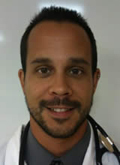
I don’t know what to do with all this hot water. My entire body is drenched, bathed in 90-degree water, and more cascades out of the shower head at high speeds every second. No more filling up a cup from a bucket of cold water and dumping it on my head, letting the water trickle down to wet the rest of me. It usually took three or four cups just to wet my body, and then I would stand there damp on a concrete floor while I soaped up, the only sounds made by my hands rubbing on the lather. Since being back in the United States, I only hear the beating of the warm water against the ceramic tiles of the shower.
I lived without the comforts of the U.S. for long periods of time, but I came home from Rwanda every few months and was pampered by the amenities of modern life. It always seemed like a vacation, a respite from the difficult living of rural Rwanda, and I indulged over the short breaks. After living in Fort Lauderdale for a month while waiting to start work in Haiti, I’m still not accustomed to the luxuries of life in the United States. I empathize with prisoners who are finally freed, not quite fitting into the society that was once their own but now seems distant and foreign. I am an alien, an outsider in my own country, in the city where I grew up.
I feel guilty for every extravagance, no matter how small. I reused the same paper napkin for lunch and dinner, not wanting to throw it out after being soiled with only a daub of mustard. When my mother placed a large piece of salmon on my plate, I was unsure whether I should or even could finish it. The massive portions at restaurants used to be no problem for me, but eating rice and beans with only occasional access to meat has left me with a smaller body frame and an appetite to match.
Life in the U.S. is bigger, faster and, in many ways, more frightening now. I wake up shivering in bed in Florida because of the air conditioning, which somehow chills me to the bone in a way that the cold mountain air in Rwanda never had. Cold drinks sting my teeth and burn my throat when I swallow, my gentle tissues unaccustomed to the temperature of the ice floating in the glass.
Shopping for simple items such as toothpaste absolutely boggles the mind. I need to decide what brand will protect my teeth the best, but then also if I want my teeth to be whiter or have less plaque or if they would benefit from the addition of baking soda to the toothpaste. The options are paralyzing. The cost of items in America is generally much more expensive. After spending a few hundred dollars a month, I have a visceral response to paying a hundred dollars for a meal at a restaurant, especially knowing that many of my patients are starving to the point of malnutrition. I nearly had a panic attack when I walked into a lounge in South Beach, previously a favorite pastime. The walls were literally lined with gold wallpaper, the couches were exquisitely designed and the people were adorned in the most up-to-date fashions. My brain almost exploded from the sensory overload and the opulence dripping down the walls into my $20 cocktail.
After not driving a car for much of the last five years, I am now sitting behind the wheel every day. The size and speed of the cars in America is nothing short of terrifying, especially on the highways in South Florida. People weave in and out of traffic lanes, blast their horns and talk or text on their cell phones, all the while their foot remains squarely on the gas pedal. My heart is in my throat every time I accelerate to keep pace with the traffic when climbing the on-ramp to the highway, truly afraid that one false move by my inexperienced hands will be the end of it all.
Driving in a private car has also prevented me from forming daily connections with the life around me. On a bus or in a group car in Rwanda, I was smashed up against my neighbors and community members. We would talk or joke or sit quietly and listen to music, but there was a connection, both physical and metaphysical. Now I turn the radio up as loud as possible, trying to sing along to a once familiar tune, but ultimately left with a feeling of isolation from other people, each of us stuck in our own personal pods zooming down the highway.
The luxury of American life has protected me from the stresses of life abroad though. After losing several patients a week for the last year and a half, my heart needed the respite. I haven’t had to meet a sick person and then watch them die for nearly a month, and for that I am sincerely grateful. Ultimately, however, the lack of a connection to patients, even dying ones, left a void, and I need to escape to Haiti, where I will have to be confronted by the misery of others but also the joy of forming human bonds with my patients. I’m off to bathe in cold water, indulge in rice and beans, and ride in pickup trucks over unpaved roads, jostling against friends and feeling more alive with each bump.
Vincent DeGennaro is an internal medicine doctor and a global public health specialist in the Department of Global Health and Social Medicine, Harvard Medical School. See his An American Doctor in Rwanda blogs.